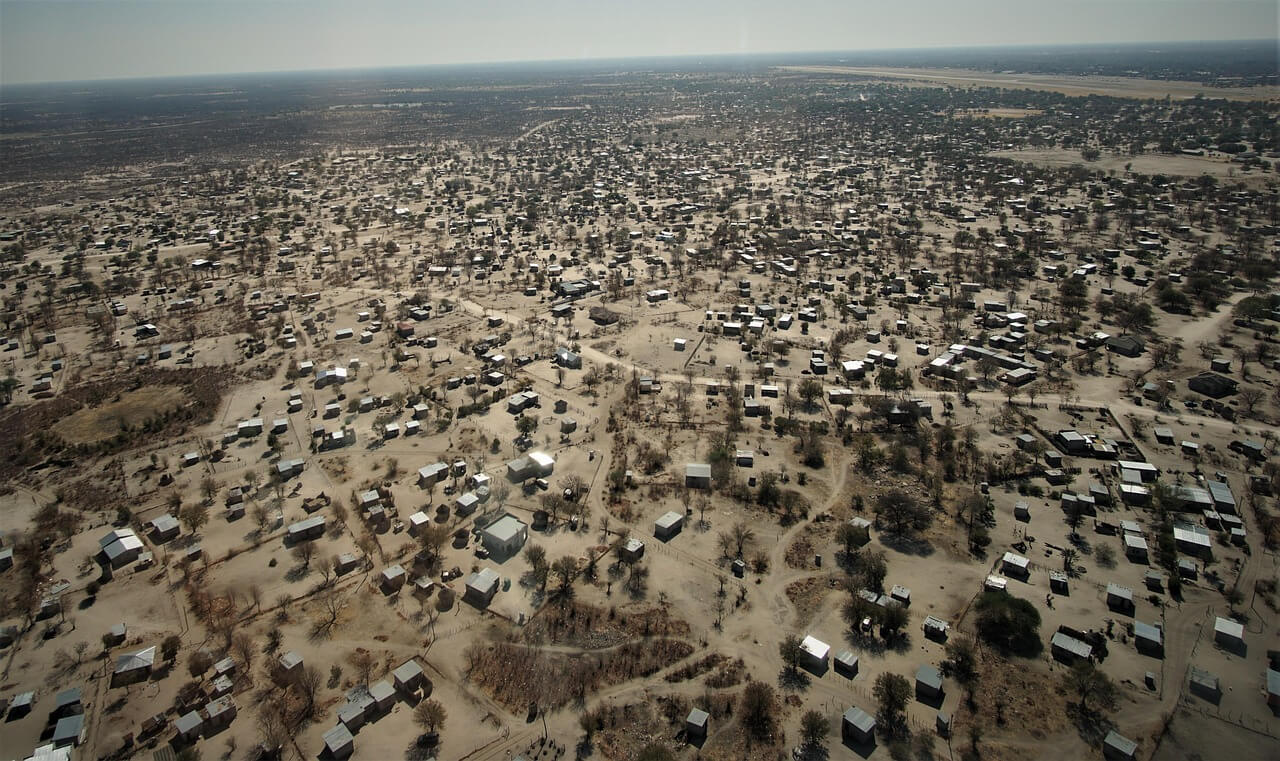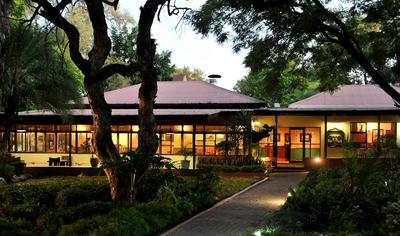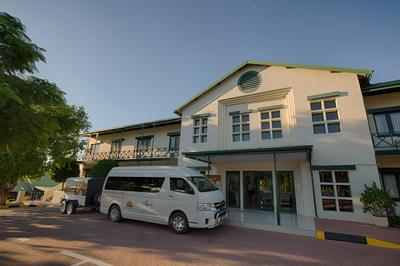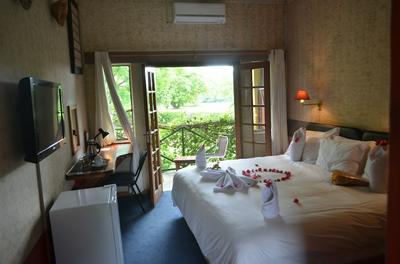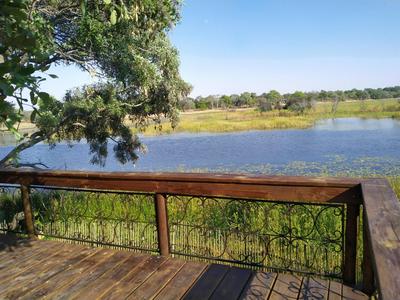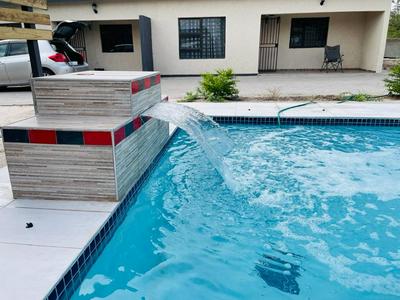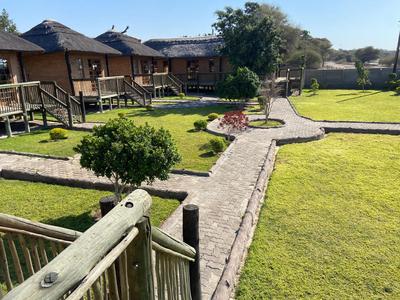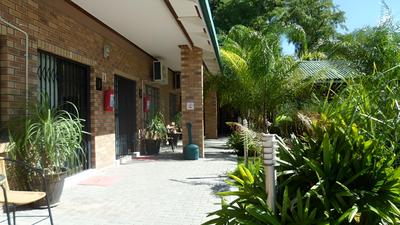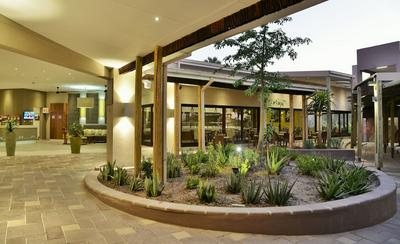When to visit Maun?
Maun, often referred to as the gateway to the Okavango Delta, has a semi-arid climate with distinct wet and dry seasons, which greatly influences the best times to visit. The dry season, from May to October, is the peak tourist period. During these months, temperatures range from mild to warm, making it more comfortable for wildlife viewing and outdoor activities.
In summer, from November to April, temperatures can soar, reaching highs of 38°C (100°F). However, this season also brings refreshing rains and vibrant green landscapes, perfect for photography enthusiasts and birdwatchers. The best time to see migratory birds is from November to March, when many species flock to the Delta.
Spring (August to October) presents the ideal conditions for game viewing. Animals gather around the waterholes, making it easier for visitors to spot them. Visit during this period to witness the spectacular natural phenomenon of the Okavango Delta.
In stark contrast, autumn (April to early June) is often a quieter time for tourism. The rains begin to taper off, and wildlife starts to become more active, providing opportunities for unique sightings away from the crowds seen earlier in the year. Overall, when planning a trip to Maun, consider your priorities – whether it’s wildlife viewing, photography, or simply enjoying serene landscapes – as each season offers a different experience.
How to get to Maun?
Getting to Maun is quite convenient, as it serves as one of Botswana's primary transport hubs. The most common way to arrive is by air, with the Maun International Airport (MUB) offering several daily flights from Gaborone, the capital, and other major cities. The flight time from Gaborone to Maun is approximately 1 hour and 30 minutes.
If you prefer land travel, there are long-distance buses that connect Maun with Gaborone and other towns, notably through the Botswana Bus Service. Buses usually take anywhere from 12 to 14 hours from Gaborone, so it's ideal for travelers keen to experience the scenic routes.
For those with more flexibility, driving to Maun is another option. The distance from Gaborone is about 1,000 km, a beautiful road trip that takes roughly 11 to 12 hours under normal driving conditions. Ensure you have appropriate maps or GPS, as well as supplies for the journey, because services along the route can be limited.
In summary, whether you fly or take a bus, Maun is well-connected for travelers looking to explore the enthralling landscapes and wildlife of northern Botswana.
Tourist activities in Maun
Maun offers a multitude of activities that cater to both nature lovers and adventure seekers. The most famous attraction is the Okavango Delta, a UNESCO World Heritage site; exploring this vibrant ecosystem is a must. Boat safaris, guided bush walks, and mokoro (canoe) trips allow you to engage with the natural world while spotting wildlife.
If you're looking for cultural immersion, visit the Maun Educational Park or engage with local communities through organized tours that highlight their way of life. The town also boasts several arts and crafts markets, where you can purchase unique souvenirs.
For adrenaline junkies, consider booking a scenic flight over the Okavango Delta for breathtaking aerial views, or try your hand at quad biking across the beautiful landscapes surrounding the city. Don't miss the opportunity to connect with local guides who can offer spectacular insights about the flora and fauna, enhancing your experience.
If you're in the mood for a relaxing day, spend time at the Thamalakane River, where you can enjoy fishing or a leisurely picnic while soaking in the serene atmosphere. Maun's diverse offerings ensure every visitor will leave with unforgettable memories.
Events and festivals
Maun hosts several exciting events and festivals throughout the year that reflect its rich cultural heritage and vibrant community spirit. One of the key events is the Maun International Arts Festival, typically held in July. This week-long celebration showcases music, art, and dance, featuring both local and international artists.
Another popular event is the Maun Cultural Festival, celebrated in September. This festival highlights Botswana's diverse cultures, featuring traditional music, dance performances, and local cuisine. It's a fantastic opportunity to experience the local traditions and connect with the community.
For sports enthusiasts, the Maun Marathon takes place around June, attracting both locals and travelers to participate in this challenging race through the scenic landscape.
Additionally, the Botswana International Tourism Expo, usually held in April, puts Maun in the spotlight as it gathers industry professionals, promoting tourism and showcasing the incredible attractions the region has to offer.
These events not only enhance the cultural fabric of Maun but also provide visitors with unique experiences that celebrate the spirit of the community.
Family and kids activities
Families visiting Maun will find plenty of engaging activities for children and adults alike. Start with a visit to the Maun Educational Park, where children can learn about local wildlife and conservation while enjoying the beautiful outdoors. The park offers educational exhibits and opportunities to see animals in more natural settings.
For some outdoor fun, take the family on a boat trip along the Thamalakane River, allowing kids to marvel at the wildlife and scenery. Guided game drives in the Okavango Delta are also a hit, giving families an exciting chance to go on safari and spot various animals while learning about their habitats.
Local crafts markets can provide an interactive experience for children as they can watch artisans at work and even try their hand at making crafts. Don’t miss the chance to take a cultural tour that introduces kids to Botswana’s rich traditions and customs.
For a more relaxed day, enjoy a picnic at one of the many parks or along the riverbanks where there are often quiet spots perfect for families to unwind. Maun truly offers activities that entertain and educate, ensuring a memorable trip for families.
What to see in Maun?
Maun boasts a variety of attractions that showcase its unique charm and natural beauty. Here are some highlights worth exploring:
- Okavango Delta: This is the crown jewel of Maun, where you can experience a mosaic of landscapes, wildlife, and plant life. Activities like mokoro trips or hot air balloon rides offer breathtaking views.
- Thamalakane River: A great spot for fishing, boat rides, and enjoying leisurely picnics with family and friends.
- Maun Educational Park: An informative space that promotes wildlife conservation education, perfect for families.
- Nhabe Museum: A cultural hub providing insights into the history of the region, showcasing local customs, artifacts, and wildlife.
- Maun Craft Market: Ideal for picking up local crafts, souvenirs, and experiencing the vibrant local market scene.
- Okavango Kopano Mokoro Community Trust: An organization that empowers local communities through sustainable tourism while providing insight into their lives.
These sites illustrate the allure of Maun, providing a blend of adventure, culture, and nature, ensuring every visitor leaves with memories that last a lifetime.
Accommodation in Maun
Maun offers a diverse range of accommodation options to suit various budgets and preferences. From budget hostels to luxurious lodges, there's something for everyone.
If you're looking for luxury, consider staying at one of the upscale lodges along the Okavango Delta, which offer stunning views and top-notch service. Places like the Kalazi Campsite are ideal for those who want to be closer to nature while enjoying comfortable amenities.
For mid-range options, there are several guesthouses and hotels located in the heart of Maun, such as the Maun Lodge and Cresta Riley’s, providing comfortable rooms and easy access to local attractions.
Budget travelers can find dormitory-style hostels and affordable campsites like the Sedia Riverside Hotel that allow for budget-friendly stays without sacrificing access to the natural wonders around. Self-catering apartments are also available for families and groups.
Choosing the right neighborhood depends on your travel style—if you prefer a laid-back vibe near nature, options near the river or Delta are perfect, while those wanting access to shops and restaurants should look towards the town center.
Important numbers and information
- Emergency numbers: 999 for police, 998 for fire services, 997 for ambulance services.
- Tourist Information Center: Located in the town center, offering maps, guides, and general travel advice.
- Main hospitals: Maun General Hospital (for emergencies), Ngami District Hospital.
- Airport contacts: Maun International Airport (MUB) has an information desk that can assist travelers.
- Public transport info: Bus schedules are available at major stops and online; local taxis can also be arranged.
- Taxi apps: Bolt and Uber operate in some areas of Maun.
- Currency: Botswana Pula (BWP). Major credit cards are accepted, and cash is often preferred at local markets.
Where to eat?
Food lovers will enjoy exploring the culinary scene in Maun, which offers a variety of dining options from local Botswana dishes to international cuisine. For an authentic taste, try local delicacies such as seswaa (slow-cooked beef) and pap (maize porridge), which can be found in many traditional restaurants.
The village offers a few popular eateries, including Panhandle Cafe, known for its delicious breakfast and coffee, and The Coffee Shop, which serves delightful pastries and light meals. For a more formal dining experience, Cresta Riley's features a menu that includes both local and international dishes, set in a comfortable atmosphere.
Street food is also prevalent, with vendors offering quick snacks, samosas, and dishes that reflect the local flavors. Dining prices are generally affordable, with local meals ranging from BWP 30 - 100, and more upscale places averaging around BWP 200 or more per meal. You'll surely find something that delights your taste buds in this vibrant town.
Nightlife – where to go out?
Maun’s nightlife may not be as extensive as in larger cities, but it offers a unique charm with several bars and clubs that come alive after sunset. The mood is relaxed, ideal for unwinding after a day filled with adventures.
Pine Tree Cafe is a local favorite for its vibrant atmosphere, serving up cold drinks, delicious cocktails, and hosting live music sessions on weekends, making it a cozy spot to mingle with locals and fellow travelers.
If you're up for dancing, Botswana Beer Garden presents a lively environment with a mix of both local and Western music, making it a popular spot for those looking to groove into the night.
For a more casual experience, check out the Maun Polo Club, which often holds events and gatherings where you can meet and mingle with the local expat community. This is not just a club but a place to socialize over food and drinks.
The main nightlife district is concentrated around the town center, where several bars and eateries offer varied experiences, from live music to sports events on large screens, ensuring you find an enjoyable way to spend your evenings.
Transport and taxis
Getting around Maun is relatively straightforward, with various transport options catering to different preferences. Public buses are available and can be an economical way to travel within the town, offering routes to major attractions. Fares are cheap, usually around BWP 5 - 10.
Taxis are a popular choice for visitors since they offer convenience and flexibility. You can find taxis readily available near the airport and in the town center. It's advisable to negotiate fares before starting your journey as meters might not be in use. Consider using taxi apps like Bolt or Uber, which have started operating in the area for added comfort.
For those looking to rent vehicles, several agencies provide reliable service, and having a 4x4 is recommended for better access to certain places, especially in the wetlands. When driving, ensure to follow local traffic rules, as roads can be bumpy and less maintained.
- Public buses: Routes cover major areas, low fares.
- Taxis: Negotiate fares; taxi apps available.
- Car rentals: Recommended for flexibility; 4x4 advised.
Parking and public garages
Parking in Maun is generally available, with various zones around the town center and attractions. Most businesses provide on-site parking, which is typically free. However, during busy seasons or popular events, securing a spot might take some time.
Street parking is permissible but be aware of local regulations to avoid fines. It’s advisable to park in well-lit, populated areas at night. There are a few designated public garages in the town center; prices for these garages usually range from BWP 10 - 20 per hour, making them an affordable option for longer visits.
Be mindful of leaving any valuables out in the open, as a general safety tip. Overall, while parking is accessible, being cautious and aware of your surroundings is key for a hassle-free experience in Maun.
Surroundings of Maun?
Exploring beyond Maun reveals even more of Botswana’s stunning landscapes and wildlife. One of the top day-trip destinations is the Okavango Delta itself. Guided tours from Maun offer the chance to experience nature through mokoro rides or guided drives, ensuring you encounter diverse wildlife.
The Moremi Game Reserve is another excellent option, only a short drive away, perceived as one of Africa’s most beautiful game reserves, renowned for its diverse wildlife and breathtaking scenery.
For a taste of local culture, visit the nearby village of Nxamaseri, where you can engage with community members and learn about traditional lifestyles, or head to the Makgadikgadi Pan, one of the largest salt flats in the world. The expansive landscapes present opportunities for stunning photographs and unique experiences.
Each destination offers not only a chance to see Botswana’s natural beauty up close but also cultural insights and adventures that can enhance your visit to Maun.
